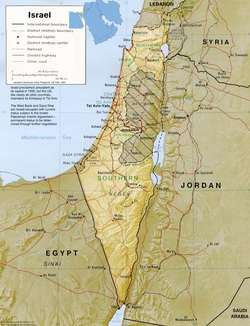Climate Change: Nature's effect on a society
Mongolia: Dust Storms, Drought, Fire and Dzud

Mongolia is a landlocked country, located between Russia and China. It is bordered by the Gobi Desert in the south and mountains to the north. This desert climate is plagued by dust storms, which can create major visibility problems as well as pose health risks from inhalation. These storms can be so intense that a decade ago, dust reached parts of the western U.S.
Frequent droughts are also a serious threat to a society already low on water supplies. They have also quickened the rate of desertification, which threatens to eliminate agriculture from the area. Droughts also kill livestock, which are necessary as a means of food and income.
A continual dryness of the land caused by droughts are the main factor of forest and grass fires. Such fires create even more pollution in an already suffering area, destroy dwindling resources and are simply dangerous for the population.
The final, and most notorious climate issue facing Mongolia is dzud, a phenomenon characterized by an exceptionally cold winter and then a summer drought. According to CNN, the worst dzub on record occurred last year. It is estimated that 7.8 million animals died as a result of the cold or lack of food during the summer. Many herders have now abandoned their livelihood and moved to the capital of Ulan Bator, where half of the residents face unemployment. The exodus to cities has also increased pollution.
For these reasons, I give Mongolia a 3 for climate change.
Frequent droughts are also a serious threat to a society already low on water supplies. They have also quickened the rate of desertification, which threatens to eliminate agriculture from the area. Droughts also kill livestock, which are necessary as a means of food and income.
A continual dryness of the land caused by droughts are the main factor of forest and grass fires. Such fires create even more pollution in an already suffering area, destroy dwindling resources and are simply dangerous for the population.
The final, and most notorious climate issue facing Mongolia is dzud, a phenomenon characterized by an exceptionally cold winter and then a summer drought. According to CNN, the worst dzub on record occurred last year. It is estimated that 7.8 million animals died as a result of the cold or lack of food during the summer. Many herders have now abandoned their livelihood and moved to the capital of Ulan Bator, where half of the residents face unemployment. The exodus to cities has also increased pollution.
For these reasons, I give Mongolia a 3 for climate change.
Israel: Sand storms, droughts and earthquakes

Israel is located in the Middle East and is bordered by Egypt, Jordan, the West Bank, Gaza Strip, Syria, Lebanon and the Mediterranean Sea. The Negev Desert is located in the south, while central Israel is dotted with mountains. The desert experiences dust storms, which reduce visibility, contaminate water and pose health risks if ingested.
Droughts also plague the region, which exacerbates the water shortage. It is difficult to renew water sources, if nature does not fulfill its expected duty. Israel has a vey short rainy season, and when even this small about of rain is not provided, produce prices soar and dairy production suffers. This can make it difficult for Israel to feed its population.
The region is also prone to earthquakes. According to the Jerusalem Post, the country has done little to prepare itself for a massive earthquake, despite warnings from experts that one is possible. As seen in the recent one in Japan, earthquakes can cause massive damage to buildings and economies and cause high death tolls.
For these reasons, I give Israel a 5 for climate change.
Droughts also plague the region, which exacerbates the water shortage. It is difficult to renew water sources, if nature does not fulfill its expected duty. Israel has a vey short rainy season, and when even this small about of rain is not provided, produce prices soar and dairy production suffers. This can make it difficult for Israel to feed its population.
The region is also prone to earthquakes. According to the Jerusalem Post, the country has done little to prepare itself for a massive earthquake, despite warnings from experts that one is possible. As seen in the recent one in Japan, earthquakes can cause massive damage to buildings and economies and cause high death tolls.
For these reasons, I give Israel a 5 for climate change.
